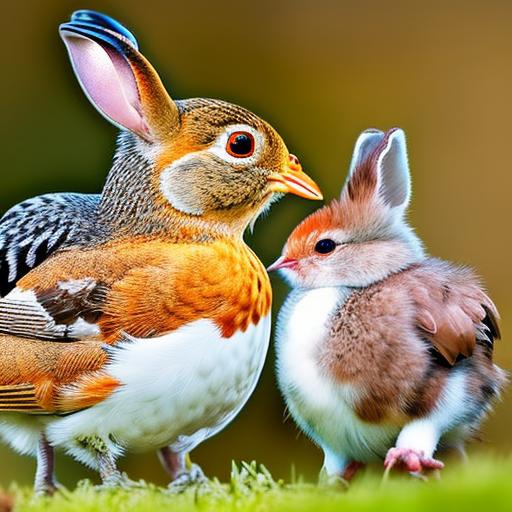Keeping rabbits and chickens together is a popular practice among homesteaders and backyard farmers. It offers several benefits, including reduced feed costs, natural pest control, and fertilizer for the garden. Personally, I have had great success in keeping rabbits and chickens together on my own property. In this article, we will explore the benefits of this practice, as well as the factors to consider before getting started.
Key Takeaways
- Keeping rabbits and chickens together can be a great way to maximize space and resources.
- Rabbits and chickens have complementary behaviors that can benefit each other.
- It’s important to understand the natural behaviors of both animals before introducing them.
- Factors such as size, temperament, and health should be considered before keeping rabbits and chickens together.
- Adequate housing, feeding, and health care are essential for keeping rabbits and chickens together successfully.
Benefits of Keeping Rabbits and Chickens Together
One of the main benefits of keeping rabbits and chickens together is reduced feed costs. Rabbits and chickens have different dietary needs, but they can share certain food sources. For example, rabbits can eat the leftover greens from the garden or kitchen, which chickens may not be able to consume. This reduces waste and saves money on feed.
Another benefit is natural pest control. Chickens are excellent at foraging for insects and other pests in the yard. By allowing them to roam freely with the rabbits, they can help keep the pest population under control. This is especially beneficial for gardeners who want to protect their crops from pests without using harmful chemicals.
Additionally, keeping rabbits and chickens together provides a natural source of fertilizer for the garden. Rabbit droppings are rich in nitrogen, phosphorus, and potassium, which are essential nutrients for plants. By allowing the rabbits to live in close proximity to the garden or using their droppings as compost, you can improve soil fertility and promote healthy plant growth.
Lastly, keeping rabbits and chickens together can provide companionship for the animals. Rabbits are social creatures that thrive in the company of others. By allowing them to interact with chickens, they have a source of stimulation and companionship. This can lead to happier and healthier animals overall.
Understanding the Natural Behaviors of Rabbits and Chickens
To successfully keep rabbits and chickens together, it is important to understand their natural behaviors and how they interact in the wild. In the wild, rabbits and chickens do not typically interact with each other. Rabbits are prey animals, while chickens are predators. However, with proper introduction and supervision, they can coexist peacefully.
It is important to recognize signs of aggression or stress in both rabbits and chickens. Aggression in rabbits can manifest as biting, scratching, or lunging. They may also thump their hind legs as a warning sign. Chickens, on the other hand, may peck or chase rabbits if they feel threatened. It is important to intervene if any signs of aggression are observed to prevent injury to either animal.
Factors to Consider Before Keeping Rabbits and Chickens Together
Before deciding to keep rabbits and chickens together, there are several factors to consider. First, you must ensure that you have enough space to accommodate both animals. Rabbits require a hutch or cage with enough room for them to hop around and stretch their legs. Chickens need a coop with enough space for them to roost and move freely.
Another factor to consider is breed compatibility. Some rabbit breeds may be more prone to aggression or stress when kept with chickens. It is important to research the specific breeds you plan to keep and ensure they are compatible with each other.
Lastly, you must consider the predators in your area. Chickens are vulnerable to predators such as foxes, raccoons, and hawks. It is important to have proper fencing and secure housing to protect both the rabbits and chickens from potential harm.
Housing Requirements for Rabbits and Chickens
When keeping rabbits and chickens together, it is important to provide appropriate housing for both animals. For rabbits, a hutch or cage with enough space for them to hop around is essential. The hutch should be well-ventilated and protected from extreme weather conditions.
Chickens require a coop that is secure and predator-proof. The coop should have enough space for the chickens to roost and move around comfortably. It should also have nesting boxes for the hens to lay their eggs.
Both rabbits and chickens require bedding in their housing. For rabbits, straw or wood shavings can be used as bedding material. Chickens require straw or wood shavings in their nesting boxes to provide a comfortable and clean environment for laying eggs.
Access to food and water is also important for both animals. Rabbits should have a constant supply of fresh hay, as well as pellets and fresh vegetables. Chickens require a balanced diet of grains, seeds, and fresh greens. Both animals should have access to clean water at all times.
Feeding and Nutrition for Rabbits and Chickens

Feeding and nutrition are crucial aspects of keeping rabbits and chickens together. Rabbits require a diet that is high in fiber, such as hay and fresh vegetables. They also need a small amount of pellets to ensure they receive all the necessary nutrients. It is important to provide a balanced diet for rabbits to prevent obesity or malnutrition.
Chickens, on the other hand, require a diet that is high in protein. They can be fed a combination of grains, seeds, and commercial chicken feed. It is important to provide a balanced diet for chickens to ensure they lay healthy eggs and maintain good overall health.
It is important to avoid overfeeding or underfeeding both rabbits and chickens. Overfeeding can lead to obesity and health problems, while underfeeding can result in malnutrition and poor egg production. It is important to monitor their food intake and adjust accordingly to meet their specific dietary needs.
Health Concerns When Keeping Rabbits and Chickens Together
When keeping rabbits and chickens together, there are several health concerns to be aware of. Both animals are susceptible to certain illnesses and diseases that can be transmitted between them.
Common illnesses in rabbits include respiratory infections, gastrointestinal issues, and parasites. It is important to provide a clean and sanitary environment for rabbits to prevent the spread of disease. Regular veterinary check-ups and vaccinations are also recommended to ensure their health and well-being.
Chickens are prone to respiratory infections, parasites, and egg-related issues. It is important to provide a clean and well-ventilated coop to prevent the spread of disease. Regular cleaning and disinfection of the coop, as well as proper hygiene practices, can help prevent illness in chickens.
If either animal shows signs of illness or distress, it is important to seek veterinary care immediately. Early intervention can help prevent the spread of disease and ensure the health and well-being of both animals.
Tips for Introducing Rabbits and Chickens to Each Other
Introducing rabbits and chickens to each other should be done gradually and with caution. It is important to allow them to get used to each other’s presence before allowing direct interaction.
Start by placing the rabbit’s hutch or cage near the chicken coop. This allows them to become familiar with each other’s scent and presence. After a few days, you can start allowing supervised interactions between the two animals.
During the initial interactions, it is important to closely monitor their behavior. Look for signs of aggression or stress, and intervene if necessary. Gradually increase the duration of their interactions over time, always ensuring their safety.
Signs of successful integration include calm behavior, relaxed body language, and mutual grooming between the animals. If they are able to coexist peacefully without any signs of aggression or stress, it is a good indication that they can be kept together.
Common Problems Encountered When Keeping Rabbits and Chickens Together
While keeping rabbits and chickens together can be a rewarding experience, there are some common problems that may arise. Aggression between animals is one of the most common issues. This can be caused by territorial behavior or breed incompatibility. It is important to intervene and separate the animals if aggression occurs to prevent injury.
Another problem that may arise is overcrowding or lack of space. Both rabbits and chickens require adequate space to move around and exhibit natural behaviors. If they are kept in cramped conditions, it can lead to stress, aggression, and health problems. It is important to provide enough space for both animals to ensure their well-being.
Health issues are also a common problem when keeping rabbits and chickens together. Both animals are susceptible to certain illnesses and diseases that can be transmitted between them. Regular veterinary check-ups, proper hygiene practices, and a clean living environment can help prevent the spread of disease.
Is Keeping Rabbits and Chickens Together Right for You?
In conclusion, keeping rabbits and chickens together can offer several benefits, including reduced feed costs, natural pest control, and fertilizer for the garden. However, it is important to consider the factors discussed in this article before getting started.
Understanding the natural behaviors of rabbits and chickens, providing appropriate housing and nutrition, and being aware of potential health concerns are all crucial aspects of successfully keeping these animals together.
Personally, I have found great joy in keeping rabbits and chickens together on my own property. The companionship between the animals and the benefits they provide have been invaluable. I encourage anyone interested in homesteading or backyard farming to give it a try for themselves. With proper planning and care, keeping rabbits and chickens together can be a rewarding and fulfilling experience.
If you’re considering keeping rabbits and chickens together, it’s important to create a suitable living environment for both species. One crucial aspect is designing the chicken coop interior to accommodate the needs of both animals. In an article by Poultry Wizard, they provide valuable insights and ideas on how to optimize your chicken coop space for the cohabitation of rabbits and chickens. From utilizing vertical space to incorporating separate nesting areas, this article offers practical suggestions to ensure the comfort and well-being of your furry and feathered friends. To learn more about creating an ideal living space for your rabbits and chickens, check out Poultry Wizard’s article on chicken coop interior ideas.
FAQs
Can you keep a rabbit and chickens together?
Yes, it is possible to keep rabbits and chickens together in the same enclosure or coop. However, there are some important considerations to keep in mind before doing so.
What are the benefits of keeping rabbits and chickens together?
Keeping rabbits and chickens together can provide several benefits, such as reducing the amount of space needed for each animal, providing companionship for both species, and allowing for easier management of manure and waste.
What are the potential risks of keeping rabbits and chickens together?
There are several potential risks associated with keeping rabbits and chickens together, such as the risk of disease transmission between the two species, the risk of injury or aggression between animals, and the risk of dietary conflicts.
What should I consider before keeping rabbits and chickens together?
Before keeping rabbits and chickens together, it is important to consider factors such as the size and layout of the enclosure or coop, the temperament and behavior of the animals, and the dietary needs of each species.
How can I ensure the safety and well-being of my rabbits and chickens?
To ensure the safety and well-being of your rabbits and chickens, it is important to provide adequate space, shelter, and food for each animal, monitor their behavior and health regularly, and take steps to prevent disease transmission and aggression between animals.
Meet Walter, the feathered-friend fanatic of Florida! Nestled in the sunshine state, Walter struts through life with his feathered companions, clucking his way to happiness. With a coop that’s fancier than a five-star hotel, he’s the Don Juan of the chicken world. When he’s not teaching his hens to do the cha-cha, you’ll find him in a heated debate with his prized rooster, Sir Clucks-a-Lot. Walter’s poultry passion is no yolk; he’s the sunny-side-up guy you never knew you needed in your flock of friends!







